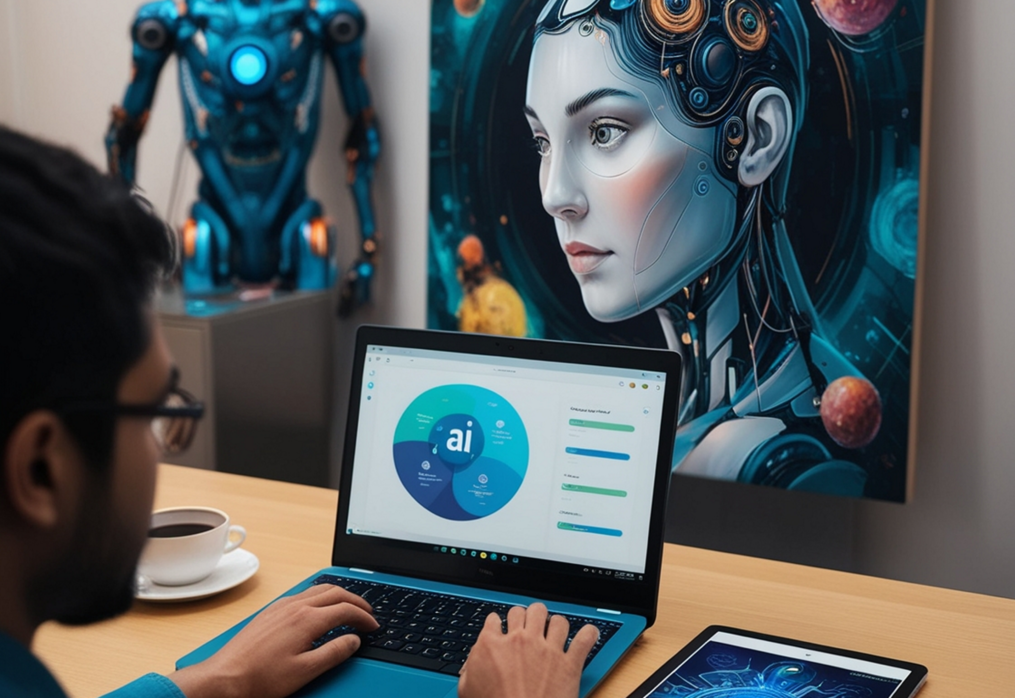Using AI in Digital Marketing: Transforming Strategies for Success
1. Introduction to Using AI in Digital Marketing
In today’s fast-paced digital world, using AI in digital marketing has become a game-changer. Marketers are finding innovative ways to incorporate AI into their strategies to drive engagement, personalize user experiences, and optimize conversions. In this blog, we’ll explore how AI technologies are transforming digital marketing and how brands can harness its power to stay ahead.
2. How AI is Shaping the Future of Digital Marketing
Artificial Intelligence (AI) is more than just a buzzword; it’s a powerful tool reshaping digital marketing by analyzing data, predicting trends, and providing actionable insights. By using AI in digital marketing, businesses can make data-driven decisions faster and create personalized experiences that resonate with their audiences.
3. Benefits of Using AI in Digital Marketing
a. Enhanced Customer Experience
AI-driven personalization offers a tailored experience to users, helping marketers reach audiences with relevant content and offers. AI can analyze user behavior patterns and preferences to suggest products or content that match individual needs.
b. Improved Decision-Making
Through machine learning algorithms, AI processes vast data volumes quickly, helping marketers understand which strategies work best. This leads to more informed decision-making, saving time and money on ineffective campaigns.
c. Automation and Efficiency
AI-powered automation tools allow marketers to streamline repetitive tasks such as email marketing, social media management, and ad placement. By automating these processes, brands can focus on strategic planning and creative development.
4. Key AI Technologies Revolutionizing Digital Marketing
Artificial Intelligence and Machine Learning (AI & ML)
Using AI in digital marketing is closely linked with machine learning, which enables computers to learn from data patterns. These technologies help marketers predict user behavior, optimize ads, and deliver personalized experiences.
Chatbots and Customer Service Automation
Chatbots powered by AI can handle customer queries in real-time, providing a seamless user experience and answering frequently asked questions. They help in customer retention and engagement by providing immediate support, which is critical in today’s competitive environment.
Predictive Analytics
AI-based predictive analytics helps brands forecast customer behavior, leading to targeted marketing efforts. By analyzing past data, AI can predict future trends, giving marketers an edge in campaign planning.

5. How to Implement AI in Digital Marketing Strategies
a. Start with Data Collection
Data is the foundation of AI-powered marketing. Begin by collecting and organizing data from various customer touchpoints, including website visits, social media engagement, and email responses.
b. Leverage AI for Personalization
Personalization is one of the most effective applications of using AI in digital marketing. Implement AI-driven tools to deliver personalized messages, product recommendations, and content that cater to each user’s preferences.
c. Use AI-Powered Automation Tools
Platforms like HubSpot, Salesforce, and Mailchimp offer AI-based automation features that streamline campaign management. These tools allow marketers to automate email marketing, social media posting, and lead scoring, saving time and increasing efficiency.
d. Optimize Content with AI Analytics
AI-driven tools like Google Analytics and SEMrush can analyze content performance and suggest improvements. By understanding user interactions, you can refine your content to improve engagement and conversion rates.
6. Real-World Examples of AI in Digital Marketing
a. Netflix and Personalized Recommendations
Netflix uses AI to analyze user preferences and recommend movies and shows tailored to individual tastes. This personalization keeps users engaged and increases the platform’s viewing time.
b. Amazon’s Voice-Activated Shopping
Amazon’s AI-driven Alexa allows users to shop using voice commands, making the process seamless and convenient. This innovative use of AI has revolutionized the e-commerce experience.
c. Sephora’s Virtual Artist
Sephora’s AI-powered Virtual Artist lets users try on makeup products virtually. This tool enhances customer experience by allowing users to see how products will look on them before making a purchase.
7. Future Trends of AI in Digital Marketing
The future of using AI in digital marketing is promising, with emerging trends expected to further enhance customer experiences and marketing strategies:
- Voice Search Optimization: As more consumers use voice-activated devices, optimizing for voice search will become essential.
- AI-Driven Content Creation: AI is beginning to generate content, from blog posts to product descriptions, based on user data and preferences.
- Emotion Detection AI: AI will soon be able to analyze emotions through facial recognition and tone analysis, helping brands tailor content that resonates on an emotional level.
8. Conclusion
Using AI in digital marketing is no longer a luxury; it’s a necessity for businesses that want to stay competitive. With AI, marketers can make data-driven decisions, personalize user experiences, and improve operational efficiency. As AI technology continues to evolve, its role in digital marketing will only grow, providing new opportunities and capabilities for brands to connect with audiences on a deeper level. Embrace AI in your marketing strategies today and prepare for a more dynamic and impactful future.

